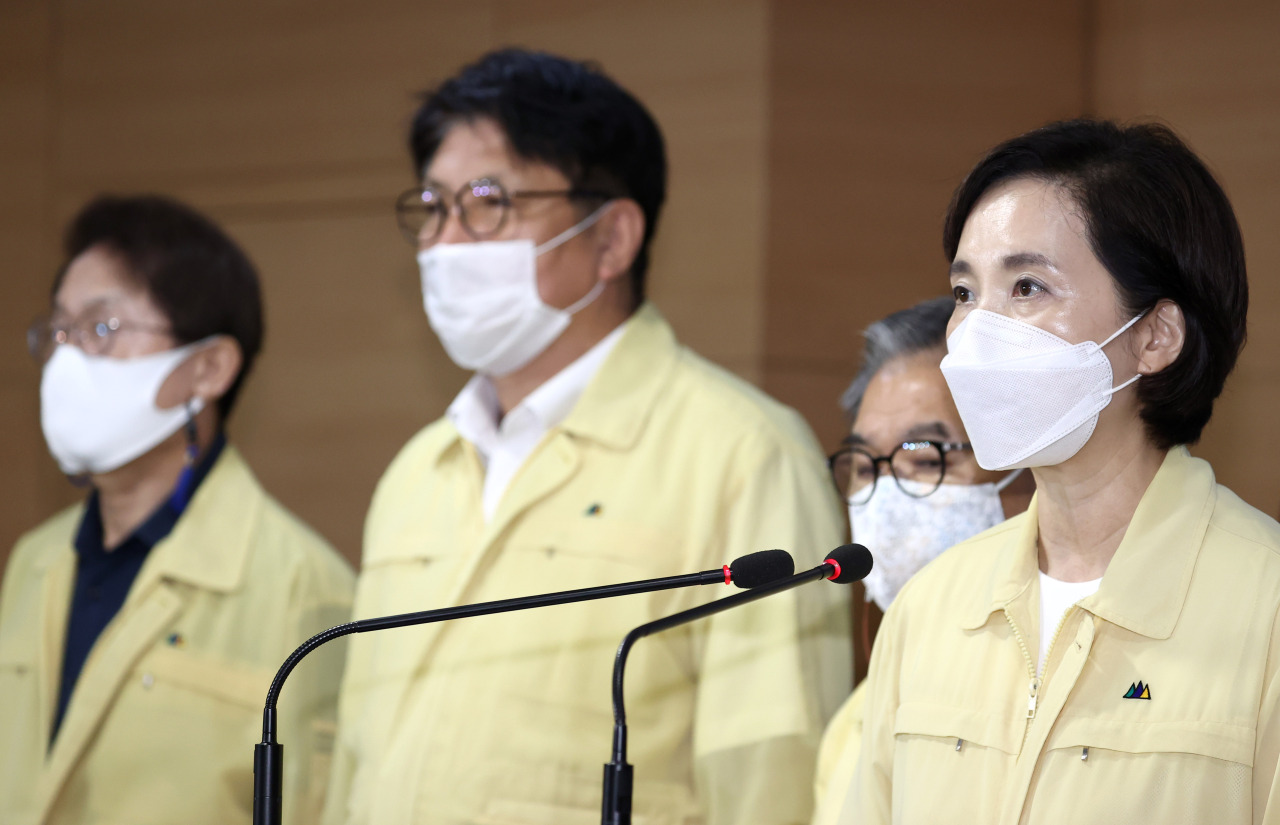South Korea on Tuesday decided to close all schools and kindergartens in the capital area until mid-September, except for one particular grade -- high school seniors.
Amid warnings over the coronavirus’s fast spread in Seoul, Incheon and Gyeonggi Province, keeping seniors in school is a “preemptive measure” both to protect students and to ensure that this year’s national college entrance exam goes ahead as planned, Education Minister Yoo Eun-hae said in a press briefing Tuesday, flanked by education superintendents for the three regions.
Tuesday marked the start of the 100-day countdown to one of the most important annual events in the country -- the Suneung.
“For the Suneung to be conducted on Dec. 3 as scheduled and without a hitch, we need to make our utmost effort now to quickly curb virus transmissions and stabilize the situation,” Yoo said.
Some 480,000 college hopefuls, including high school graduates wishing to repeat the test, will sit the grueling daylong test, which was already postponed by two weeks due to the virus outbreak earlier this year.
As high school seniors prepare for the exam, which could determine their chances in the cutthroat university admission race and the complex university admission process, physical school attendance is essential, the ministry explained.
A mock Suneung test is scheduled Sept. 16, and most universities begin accepting application materials Sept. 23.
Some raised the possibility of the Suneung being pushed back to a later date once again, but the Education Ministry said it is not considering that option at the moment.
If the coronavirus situation does not improve and the social distancing rules are raised to the highest level -- Level 3, which would make in-person learning off limits for high school seniors as well -- Minister Yoo said she will “take the special situation of high school seniors into consideration.”
There is a persistent concern, however, among students and teachers that in-person classes could expose the students to a greater risk of catching the virus.
If one student is diagnosed with COVID-19, not only a single class but the entire school, including teachers, has to get tested.
According to government data, 307 students so far had been confirmed positive for the novel coronavirus by the end of Monday. High school students accounted for 114 of those cases, although no detailed breakdown was available showing how many are in the third grade.
“If there is one confirmed case among the exam preparers, that will cause damage not only to the person infected but to classmates as well as the whole school,” said an online petition to the Blue House that had garnered close to 5,000 signatures as of 4:30 p.m. Tuesday.
“(With first semester now over), all school exams to be factored into grades for this year’s college admission are over, so there would be no problem with pursuing online learning for all high school seniors as well,” the petition said.
The recent spike in COVID-19 infections is a key concern for college hopefuls who are not currently in school, as large private prep institutions are being forced to close in line with quarantine measures.
With the imposition of Level 2 social distancing guidelines earlier this month, the government ordered large prep institutes -- some of which have boarding options -- to suspend operations if they served more than 300 people.
The parents of repeat test takers fiercely opposed the order, asking that students be allowed to remain at the institutes and concentrate on their studies. They argued that the students were safer there, if proper measures were taken.
At the moment, all boarding cram schools have sent their students back home since the government issued its order Sunday. Many of them are now providing online courses.
While some parents protested the decision through public petitions, the Education Ministry said controlling the virus situation must take priority over their requests.
Some civic groups and parent associations have voiced the need to make this year’s Suneung easier or to change the scoring system for a fairer evaluation, given the extreme conditions facing students. But Sung Ki-sun, president of the Korea Institute for Curriculum and Evaluation, which manages the Suneung, made clear in June that there is no reason to adjust this year’s test and that the questions will be similar in difficulty to those of previous years.
“By now, no further changes should be made, especially with the test,” said Lim Sung-ho, CEO of Haneul Education and Jongro academic institute.
“Questions should be written in accordance with the original standards, and officials should focus on how to execute the test (safely) rather on than the test itself.”
Lim advises students to stay focused for the remaining months and maintain their pace whatever happens.
“This coronavirus situation has been anything but helpful to those preparing for the Suneung,” he said. “Nobody is winning at this point, and those who keep their studying pace and maintain regular schedules will prevail in the race.”
Meanwhile, the Education Ministry is working to ensure that students infected with COVID-19 or in self-quarantine will be able to take this year’s Suneung as well.
Students infected with the virus can take the test in hospitals or at other government institutes. Those in self-quarantine are required to travel by car or ambulance to take the exam at separate, designated testing sites.
The ministry is planning to provide further quarantine guidelines in late September or early October after consulting with relevant government agencies.
By Ko Jun-tae (
ko.juntae@heraldcorp.com)








